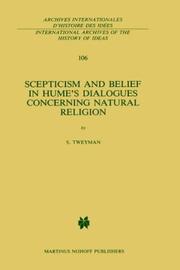| Listing 1 - 4 of 4 |
Sort by
|
Book
ISBN: 9780190673505 0190673508 Year: 2017 Publisher: Oxford Oxford University Press
Abstract | Keywords | Export | Availability | Bookmark
 Loading...
Loading...Choose an application
- Reference Manager
- EndNote
- RefWorks (Direct export to RefWorks)
Why did David Hume feel so deeply about publishing The Dialouges Concerning Natural Religion that he set aside funds in his will providing for its posthumous publication? Part of the answer is that it provided a literary, satirical work responding to his mean-spirited theological critics. In Hume's Presence Robert J. Fogelin provides a textual analysis that demonstrates the close relationship of The Dialogues with his central philosophical writings and its centrality to his relationship with skepticism. A striking feature of The Dialogues is that Cleanthes and Philo seem well versed in the works of the philosopher David Hume. Their arguments often echo in content―even wording―claims found in Hume's central philosophical writings. Beyond this, the overall dialectical structure of The Dialogues mirrors dialectical developments found in both The Treatise of Human Nature and the Enquiry Concerning Human Understanding: the naturalistic effort to provide a rational defense of religion ends in weakening religious commitments rather than in strengthening them. Nowhere in The Dialogues does Hume address his readers directly. As a result, it may not immediately be clear whether Hume is expressing his own opinions through one of his characters or is using a character to represent a position he wishes to examine, perhaps to reject. The Dialogues is a contest, and Hume, by not speaking directly in his own voice, leaves it-officially, at least-to his readers to judge who, if anyone, wins. The central problem of The Dialogues is to consider what Hume understood by skepticism. The second section of this book examines competing views of Hume's skepticism, concluding with his own remarks. In the Treatise and the Enquiry, Hume says, when consumed by skeptical arguments and reasoning, he finds philosophical nurture in rejoining the practices of everyday life. His famous, concluding remark in The Dialogues about skepticism being the basis for a believing Christian seems cut from the same cloth.
natuurlijke godsleer --- Theory of knowledge --- Hume, David --- Religion --- Natural theology --- Philosophy --- Hume, David, --- Religion - Philosophy --- Hume, David, - 1711-1776 - Dialogues concerning natural religion
Book
ISSN: 07661398 ISBN: 2130535798 9782130535799 Year: 2005 Volume: 180 Publisher: Paris : PUF - Presses Universitaires de France,
Abstract | Keywords | Export | Availability | Bookmark
 Loading...
Loading...Choose an application
- Reference Manager
- EndNote
- RefWorks (Direct export to RefWorks)
La question du scepticisme et de son sens fournit une vois d'accès privilégiée au texte des Dialogues. D'où l'intérêt de les lire du point de vue de leur rapport à ce que Hume définit comme un scepticisme mitigé. Il constitue la version humienne d'une conception ancienne du scepticisme authentique dont le sens est ainsi mis en jeu ainsi que la nature de la croyance en général et de la foi religieuse en particulier.
Hume, David --- Ongeloof --- Scepticism --- Scepticisme --- Skepticism --- Unbelief --- Philosophy, English --- Faith and reason --- Philosophie anglaise --- Foi et raison --- History --- Histoire --- Hume, David, --- Hume, David, - 1711-1776 - Dialogues concerning natural religion
Book
ISBN: 0824054156 9780824054151 Year: 1983 Volume: 16 Publisher: New York (N.Y.): Garland
Abstract | Keywords | Export | Availability | Bookmark
 Loading...
Loading...Choose an application
- Reference Manager
- EndNote
- RefWorks (Direct export to RefWorks)
God --- Hume, David, --- Rome --- Byzantine Empire --- History --- Natural theology --- Natural religion --- Theology, Natural --- Apologetics --- Religion --- Religion and science --- Theology --- Philosophy of nature --- Gibbon, Edward --- Hume, David --- ヒューム --- -History --- -Natural theology --- -God --- Metaphysics --- Misotheism --- Monotheism --- Theism --- Gibbon, Edward, --- History. --- Hume, David, - 1711-1776 - Dialogues concerning natural religion --- Rome - History - Empire, 30 BC-476 AD --- Byzantine Empire - History

ISBN: 9024730902 9024724333 9401084297 9400943415 9789024730902 Year: 1986 Volume: 106 Publisher: Dordrecht ; Boston, MA ; Lancaster : Martinus Nijhoff,
Abstract | Keywords | Export | Availability | Bookmark
 Loading...
Loading...Choose an application
- Reference Manager
- EndNote
- RefWorks (Direct export to RefWorks)
Belief and doubt --- Natural theology --- Skepticism --- 1 HUME, DAVID --- Scepticism --- Unbelief --- Agnosticism --- Free thought --- Natural religion --- Theology, Natural --- Apologetics --- God --- Religion --- Religion and science --- Theology --- Philosophy of nature --- Conviction --- Doubt --- Consciousness --- Credulity --- Emotions --- Knowledge, Theory of --- Philosophy --- Psychology --- Will --- Rationalism --- 1 HUME, DAVID Filosofie. Psychologie--HUME, DAVID --- Filosofie. Psychologie--HUME, DAVID --- Hume, David, --- Théologie naturelle --- Scepticisme --- Croyance et doute --- Hume (David). Théologie naturelle. --- Hume (David). Godgeleerdheid (Natuurlijke). --- Hume, David --- Hume, David, - 1711-1776 - Dialogues concerning natural religion --- Hume (david), philosophe anglais, 1711-1776 --- Theologie naturelle --- Critique et interpretation
| Listing 1 - 4 of 4 |
Sort by
|

 Search
Search Feedback
Feedback About UniCat
About UniCat  Help
Help News
News